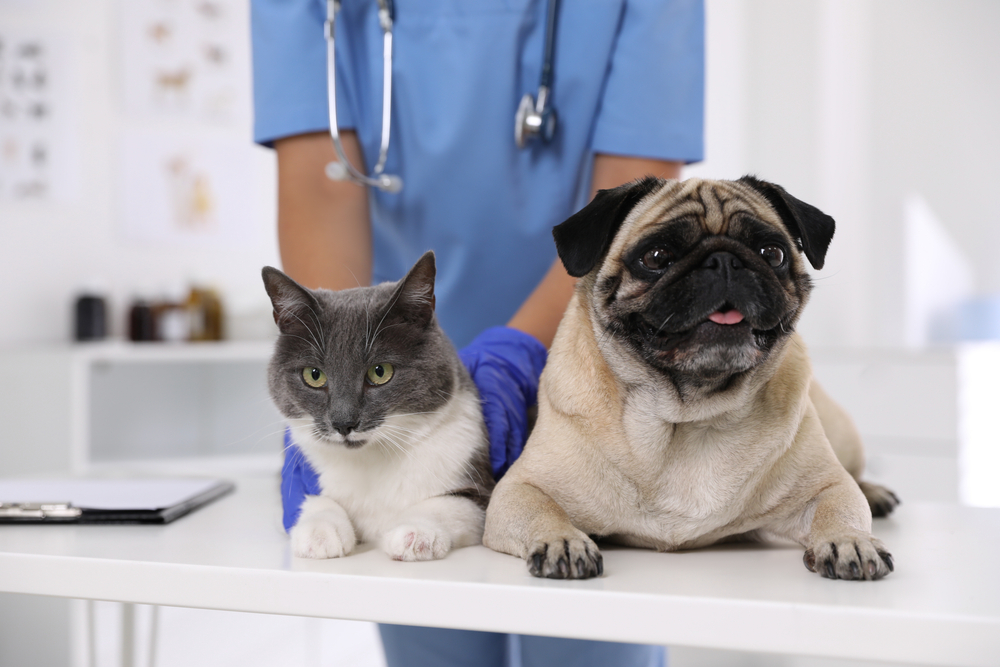Your pet is due for their vaccinations, but instead of a quick stick, your veterinarian insists on doing a thorough nose-to-tail exam. Your four-legged friend seems as healthy as a horse, so is this really necessary, or a waste of time and expense? Our Mount Pleasant Animal Hospital team practices gold-standard medicine, and we want you to understand why pre-vaccination exams are vital for keeping your pet happy and healthy.
#1: Establishing your pet’s baseline
Your pet is one of a kind in the way they look and act, and in their vital signs. Our team needs to know how your pet’s heart and lungs sound when they are healthy, so we can better diagnose them when they are sick or hurt. Some pets get nervous during veterinary exams, and their heart and respiratory rates increase. If we know this information based on their wellness examination, we can form a better diagnostic plan when your pet needs medical care.
#2: Detecting pet illnesses
Pets often don’t show signs of illness or pain until their condition is advanced. They may no longer have to worry about lurking predators, but they retain their ancestors’ instincts to hide vulnerabilities, which means that they may act perfectly normal when they are sick or hurt. Performing an exam before we administer your pet’s vaccines helps us detect issues such as heart abnormalities, abdominal tumors, and enlarged lymph nodes that may not be apparent during your daily interactions with your pet. When we detect health conditions in the early stages, they are typically easier to manage and treat, and your pet has a better prognosis.
#3: Promoting your pet’s dental health
About 80% of pets have some degree of dental disease by the time they are 3 years of age. During a pre-vaccine exam, our team can evaluate your pet’s mouth and determine if a professional veterinary dental cleaning is necessary. These procedures can increase your pet’s life expectancy by three to five years, so they are extremely important to your pet’s health. During a routine wellness examination, we evaluate your pet’s teeth and gums to check for signs such as bad breath, tooth discoloration, and swollen or irritated gums.
#4: Tracking your pet’s weight
The majority of pets in the United States are overweight, and excess weight predisposes your four-legged friend to serious health complications, such as cancer, diabetes, arthritis, and kidney disease. Many owners don’t realize their pet is overweight, but during your pet’s pre-vaccine wellness exam, our team will weigh your pet and perform a body conditioning score to assess their weight status. This information allows us to provide knowledgeable advice concerning your pet’s nutritional needs.
#5: Determining your pet’s vaccine needs
Examining your pet helps our team determine if your pet is healthy enough to receive their vaccines, or whether we need to postpone their vaccines or recommend diagnostics before proceeding. In addition, this is a great time for you to let us know if your pet’s lifestyle has changed. Have you started taking your dog for hikes in rural areas? Do you have an upcoming trip that requires you to board your pet? Are you installing a pet door to let your cat spend time outdoors? This information helps our team determine what vaccines and preventive care are best for your pet.
#6: Establishing a veterinary-client-patient relationship
As licensed veterinarians, we are bound by veterinary governing bodies and our commitment to pet health to establish a veterinary-client-patient relationship (VCPR) before administering veterinary care, including vaccines, to your pet. A VCPR, which involves thoroughly examining your pet, is good for 12 months, meaning that we cannot diagnose, treat, or prescribe medication for your pet without first examining them and establishing a VCPR. In addition, we must adhere to strict requirements when administering the rabies vaccine, which is enforced by state law.
While a VCPR is considered good for 12 months, this doesn’t apply if your pet is sick or injured. They will need to be seen for any new condition they have before we can diagnose them or dispense medication.
#7: Giving you peace of mind
Hearing your pet has a clean bill of health is a great relief and confirms that you are providing the best possible care for your four-legged friend. In addition, you can use this time to address any of your concerns about your pet’s health or behavior. Our team is here to provide advice about your pet’s nutrition, behavioral issues, or any other worries you may have.
Hopefully, this information helps you see why pre-vaccination examinations are crucial to your pet’s health and well-being. Contact our Mount Pleasant Animal Hospital team to schedule an appointment.








